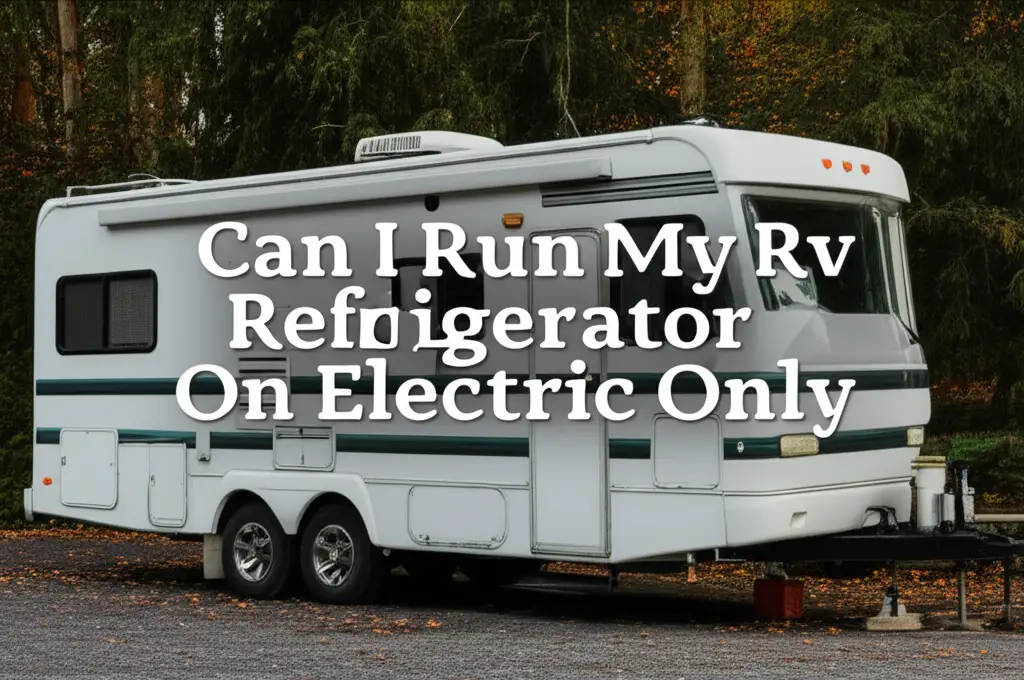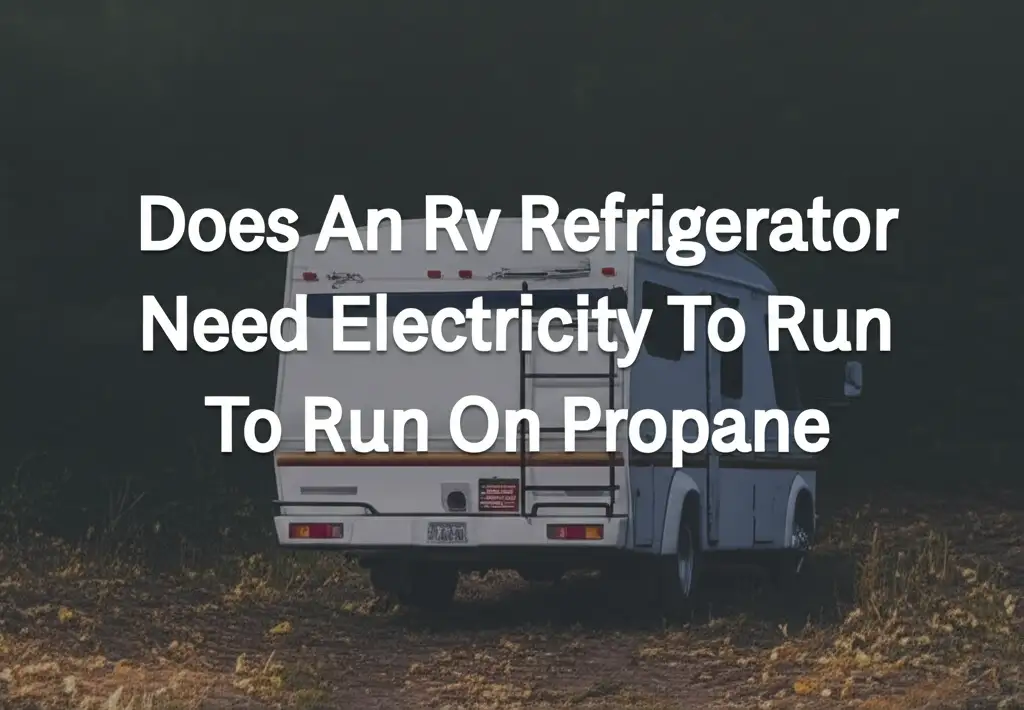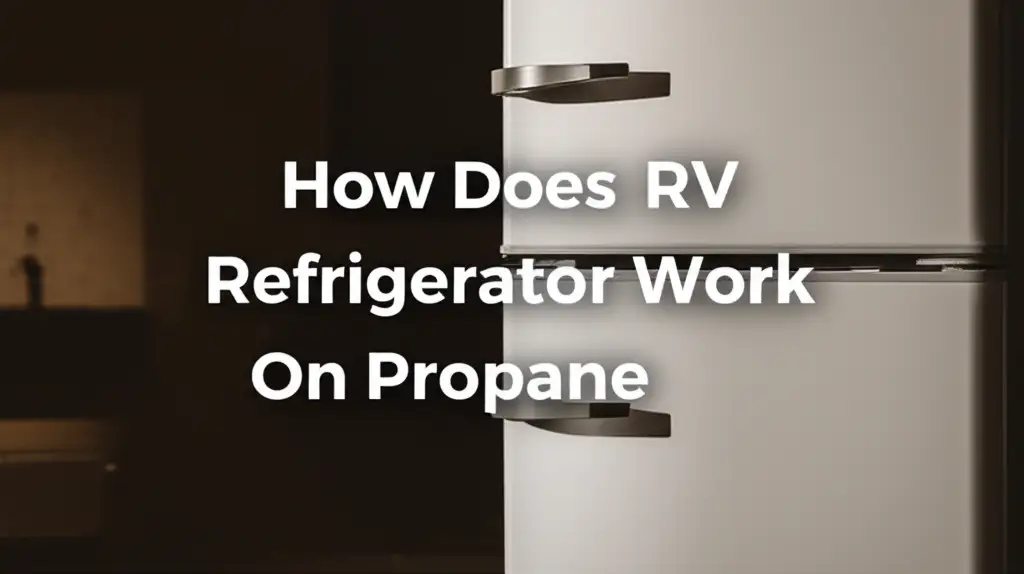· Todd Martin · RV Appliances · 19 min read
Can You Run An Rv Refrigerator On 110

Powering Your RV Refrigerator: Can You Run An RV Refrigerator On 110?
Hitting the open road in your RV offers freedom and adventure. Keeping your food fresh is a big part of that experience. Many RV owners often wonder about their refrigerator’s power needs. Specifically, a common question arises: can you run an RV refrigerator on 110-volt electricity? Understanding your RV fridge’s power options is essential for a smooth trip.
This article will explore how RV refrigerators operate on 110V power. We will discuss the types of RV fridges and their electrical requirements. You will learn about optimizing performance and common troubleshooting steps. My goal is to give you a clear picture of using 110V for your RV’s cooling needs.
Takeaway:
- Most RV refrigerators are designed to run on 110V AC power when connected to shore power.
- Absorption fridges use a heating element, while compressor fridges use a compressor for cooling on 110V.
- Ensure proper ventilation and leveling for optimal 110V performance, especially for absorption models.
- Monitor power draw to avoid tripping breakers, especially with older RVs or limited campground power.
Yes, you can absolutely run an RV refrigerator on 110-volt AC (alternating current) power. This is the standard household electricity found in campgrounds, homes, and generators. Most RV refrigerators are built to seamlessly switch to 110V when it is available, ensuring your food stays cold.
Understanding RV Refrigerator Types and Power Sources
RV refrigerators are not all the same. They come in different types, each with its own way of cooling. Knowing your fridge type helps you understand how it uses 110V power. I will explain the two main kinds of RV refrigerators.
Absorption RV Refrigerators
Absorption refrigerators are common in many RVs. They do not use a compressor like a home fridge. Instead, they use a heat source to start a chemical reaction. This reaction creates the cooling effect. When you run an RV refrigerator on 110V, an electric heating element provides this heat.
These refrigerators are very quiet. They use ammonia, water, and hydrogen gas in a sealed system. The 110V heating element warms the ammonia-water solution. This causes ammonia gas to vaporize. The gas then travels through coils, where it condenses and evaporates. This process removes heat from inside the fridge. Absorption fridges are often called “two-way” or “three-way.” Two-way fridges run on propane or 110V AC. Three-way fridges add 12V DC power for travel. Understanding how this system works helps with troubleshooting.
Compressor RV Refrigerators
Compressor refrigerators are newer to the RV market. They work much like your fridge at home. They have a compressor that circulates a refrigerant. This refrigerant absorbs heat from inside the fridge and releases it outside. These fridges cool down quickly and are very efficient.
Many compressor RV fridges are “12V DC compressor” types. This means their primary power is 12V DC. However, most modern 12V compressor fridges also have a built-in power converter. This allows them to run directly on 110V AC when available. The converter changes the 110V AC to 12V DC for the fridge. Some larger models might even have a dedicated 110V AC compressor. Compressor fridges generally use less power over time than absorption models when running on electric.
Comparing Power Needs
When considering power, it’s important to differentiate. Absorption fridges use 110V primarily for the heating element. This element draws a significant amount of power when active. Compressor fridges use 110V to power their compressor. Their power draw is generally lower once they reach temperature. Knowing which type you have will inform your power management. This is key for efficient camping.
The Basics of Running Your RV Refrigerator on 110V AC Power
Running your RV refrigerator on 110V AC power is usually straightforward. It is often the preferred method when shore power is available. This ensures your RV’s 12V battery system is not drained. It also saves your propane supply. I will explain how this connection works and what to expect.
Connecting to Shore Power
When you plug your RV into a campground pedestal, you are connecting to shore power. This provides 110V AC electricity to your entire RV. Your RV’s electrical system is designed to distribute this power. This includes outlets, appliances, and your refrigerator. Most RV refrigerators have an automatic transfer switch. This switch detects the presence of 110V power. It then switches the fridge operation from propane or 12V DC to 110V AC. This happens without you needing to do anything.
Ensure your shore power connection is secure. A loose connection can cause voltage drops. This can harm your refrigerator’s performance. Always use the correct adapter if your RV’s plug does not match the pedestal’s outlet. Many RVs use a 30-amp or 50-amp connection.
Initial Cooling and Efficiency
An RV refrigerator needs time to cool down. Whether on 110V or propane, it is best to turn it on several hours before loading food. For optimal cooling, I always suggest starting it 6-8 hours ahead. This ensures it reaches the proper temperature. You can find more details on how long an RV refrigerator takes to get cold. how long does rv refrigerator take to get cold
On 110V, absorption fridges draw constant power for their heating element. Compressor fridges draw power intermittently as their compressor cycles on and off. Both types are generally more efficient on 110V than on 12V DC. This is because 12V DC typically pulls more amps from your battery system. Using 110V helps preserve your battery life for other uses. It also avoids the need for propane when electricity is readily available. This makes 110V a reliable and convenient power source for your RV refrigerator.
Why 110V is Crucial for RV Fridge Operation
The availability of 110V power is very important for RV refrigerators. It serves as the primary and most efficient power source when stationary. This section explains why 110V is a vital part of your RV’s cooling system. It also covers what happens when it is not present.
Stability and Consistency
When plugged into shore power, your RV receives a stable 110V AC supply. This steady power allows your refrigerator to maintain consistent temperatures. Absorption refrigerators need a continuous heat source. 110V provides this reliably. Compressor refrigerators also benefit from stable voltage. It prevents strain on their components. Relying on 110V reduces wear and tear on other power sources. For example, it prevents constant cycling of your propane system or draining your 12V battery. This stability helps prolong the life of your appliance.
Energy Efficiency and Cost Savings
Running your RV refrigerator on 110V is often the most economical choice. Campgrounds usually include electricity in their fees. This means your fridge operates without additional cost. Using 110V also saves your propane supply. Propane is a finite resource in your RV. Conserving it is wise for boondocking or dry camping.
While 12V DC operation is possible, it draws heavily on your batteries. This requires frequent recharging via solar, generator, or your engine. 110V eliminates this concern. It allows your batteries to charge and handle other RV loads. This makes 110V an ideal power source for extended stays. In fact, many RV owners prefer to run their RV refrigerator on electric only when they have the option. can i run my rv refrigerator on electric only
Limitations Without 110V
Without 110V power, your RV refrigerator must switch to an alternative. For most, this means propane or 12V DC. Propane is excellent for boondocking. However, it uses a flame, which might not be allowed in some areas. Also, while the cooling effect comes from propane, many RV refrigerators still require a small amount of 12V electricity to operate their control board, igniter, and circulation fan. does an rv refrigerator need electricity to run on propane
12V DC power is typically used for short travel times. It is less efficient for long-term cooling. It can quickly drain your RV’s house batteries. If your RV refrigerator stops working on electric, it is often due to a 110V issue. This could be a tripped breaker or a faulty heating element. Understanding these limitations helps you plan your power usage effectively.
Optimizing Your RV Refrigerator’s Performance on 110V Shore Power
Getting the best performance from your RV refrigerator on 110V involves more than just plugging it in. A few simple practices can make a big difference. These tips help your fridge cool more efficiently and last longer. I will share some key strategies for optimal operation.
Proper Leveling and Ventilation
For absorption refrigerators, being level is critical. The cooling process relies on gravity to circulate fluids. If your RV is not level, the fluids can pool. This stops the cooling cycle. Even a slight tilt can reduce efficiency significantly. Always ensure your RV is as level as possible when parked. You can check this with a small bubble level. This advice is so important that it has its own detailed discussion. does an rv refrigerator have to be level to work
Good ventilation is also vital. RV refrigerators are installed in a compartment. This compartment needs airflow. Hot air from the cooling process must escape. If hot air gets trapped, the fridge struggles to cool. Check that external vents are clear of obstructions. Sometimes, an RV refrigerator fan helps move air. If you notice your RV refrigerator fan goes on and off frequently, it might indicate it’s working hard to dissipate heat. why does my rv refrigerator fan go on and off Ensuring proper ventilation helps the fridge run more efficiently on 110V.
Pre-Cooling and Loading Habits
Before you load food, pre-cool your RV refrigerator. Turn it on at least 6-8 hours before departure or before adding groceries. This brings the interior temperature down to a safe level. Loading warm food into a warm fridge makes it work much harder. This can take a long time to cool down.
Once cooled, load your fridge strategically. Do not overpack it. Air needs to circulate inside for effective cooling. Use containers to organize food and minimize spills. When traveling, limit how often you open the door. Each time you open it, warm air enters. This forces the fridge to work harder to regain its temperature. Consider freezing water bottles or gel packs. You can place these in the fridge to help maintain coolness.
Monitoring and Maintenance
Regular monitoring helps catch issues early. Check your fridge’s temperature daily with a separate thermometer. This confirms it is cooling correctly. If your RV refrigerator is not getting cold, it could be a sign of a larger issue. why is my rv refrigerator not getting cold
Keep the cooling fins inside the fridge clean. Dust and debris can build up on the condenser coils outside. Clean these annually. This improves heat exchange. Check door seals for leaks. A leaky seal lets cold air escape. This forces the fridge to run more. Periodically inspect the 110V electrical connection. Ensure it is tight and free from corrosion. These simple maintenance steps ensure your RV refrigerator runs efficiently on 110V for years to come.
Troubleshooting Common 110V RV Refrigerator Issues
Even with proper care, RV refrigerators can sometimes have problems. When your RV refrigerator is running on 110V and not cooling, it can be frustrating. Many issues are easy to fix. I will cover common problems and their solutions.
No Power to the Refrigerator
The first step in troubleshooting is checking the power supply. If your RV refrigerator does not seem to be getting any 110V power, start at the source.
- Check the shore power connection: Ensure your RV is securely plugged into the campground pedestal. Is the pedestal breaker tripped? Reset it if needed.
- Check RV circuit breakers: Your RV has its own circuit breaker panel. Locate the breaker labeled for the refrigerator and make sure it is not tripped. If it is, reset it. If it keeps tripping, there might be a short or overload.
- Check the GFI outlet: Sometimes, RV refrigerators are plugged into a GFI (Ground Fault Interrupter) outlet. If this outlet trips, power to the fridge will cut off. Find the GFI outlet and press the “reset” button.
- Inspect the refrigerator’s power cord: Look for any visible damage to the cord or plug. A damaged cord can prevent power from reaching the unit.
If your RV refrigerator works on propane but not electric, it points directly to a 110V electrical issue. This is a common problem with specific troubleshooting steps. why does my rv refrigerator work on propane but not electric
Refrigerator Running But Not Cooling on 110V
If your RV refrigerator lights are on and it seems to be running but not getting cold, the issue is different. This often points to a problem with the cooling system itself.
Absorption Fridges:
- Heating Element Failure: The 110V heating element is crucial for absorption models. If it burns out, the cooling cycle stops. You can test the element’s resistance with a multimeter. Replacing it is a common DIY fix.
- Lack of Leveling: As mentioned, proper leveling is critical for absorption fridges. Even slight unleveling can cause the cooling process to stop. Re-level your RV immediately.
- Blocked Ventilation: Trapped hot air prevents proper heat dissipation. Ensure external vents are clear. Check if the internal cooling unit coils are dusty or blocked.
- Bad Cooling Unit: In rare cases, the sealed cooling unit itself can fail. This usually requires professional replacement. Signs include a yellow residue (ammonia leak) or a strong ammonia smell.
Compressor Fridges:
- Compressor Issues: A faulty compressor will prevent cooling. You might hear it try to start and fail, or it might be completely silent. This usually requires a service technician.
- Fan Malfunction: Many compressor fridges have a fan to move air over the condenser coils. If this fan fails, the fridge won’t cool effectively.
- Control Board Malfunction: The control board manages the compressor cycling and temperature settings. A faulty board can prevent proper cooling.
It is frustrating when your RV refrigerator runs but does not cool. This issue usually means there’s a problem with the cooling system itself, whether it is an absorption or compressor model. why is my rv refrigerator running but not cooling
General Tips
Always consult your RV refrigerator’s owner’s manual. It contains specific troubleshooting guides for your model. If you are not comfortable with electrical testing, consider hiring a certified RV technician. Safety is always first when dealing with electricity.
Comparing 110V Operation with Other RV Fridge Power Options
While 110V is a primary power source for RV refrigerators, it’s not the only one. RVs are designed for versatility. This means their fridges can often run on multiple power types. Understanding these options helps you choose the best one for your situation. I will compare 110V operation with propane, 12V DC, and solar power.
110V AC vs. Propane
Most absorption RV refrigerators are designed to run on both 110V AC and propane.
- 110V AC (Shore Power): This is ideal when connected to an electrical hookup. It offers consistent cooling. It also saves your propane supply. Using 110V is often included in campground fees.
- Propane: Propane is excellent for boondocking or dry camping. It allows your fridge to run without an electrical hookup. It uses a small amount of 12V DC power for the control board and igniter. You can even run your RV refrigerator on propane while driving, which is a common practice for many RVers to keep food cold on the move. can you run an rv refrigerator on propane while driving Propane consumption varies but a typical 20lb tank might last several weeks for fridge use.
Both options offer strong cooling. The choice depends on power availability and your camping style.
110V AC vs. 12V DC
12V DC power is supplied by your RV’s house batteries.
- 110V AC: This is the most efficient and sustainable electric option when plugged in. It puts no drain on your batteries.
- 12V DC: Traditional absorption fridges use 12V DC primarily for the control board and internal fan. They do not cool efficiently on 12V DC alone. Newer compressor-style RV refrigerators, however, are designed to run on 12V DC as their primary power. They are much more efficient on 12V than absorption models. They can often run for days on batteries. You might find a compressor fridge can run on electric only through its 12V system. can i run my rv refrigerator on electric only
For extended periods, 110V AC is superior for power conservation. 12V DC is best for transit or short periods off-grid with compressor fridges.
110V AC vs. Solar Power
Solar power is an increasingly popular option for RVers.
- 110V AC: Direct plug-in power. Unlimited supply as long as you are hooked up.
- Solar Power: Solar panels charge your 12V house batteries. These batteries then power your 12V compressor fridge directly. For absorption fridges, solar can power the 12V control board. To run an absorption fridge on its 110V heating element via solar, you would need a large inverter and a substantial battery bank. This is generally not practical. However, some RVers do use solar power to run their RV refrigerator, especially if they have a 12V compressor model. can i run my rv refrigerator on solar power
Solar is excellent for off-grid power independence. However, it requires a significant initial investment. It also relies on sunlight. 110V provides reliable power regardless of weather. Each power source has its advantages. Using them wisely ensures your RV refrigerator keeps your food cold, wherever you are.
Safety Considerations When Using 110V for Your RV Refrigerator
Electrical safety is paramount in an RV. When running your RV refrigerator on 110V, specific precautions are necessary. These steps protect you, your RV, and your appliances. I will outline the most important safety aspects.
Proper Electrical Connections
Always ensure your RV’s electrical connection to shore power is secure and correct.
- Correct Amperage: Use the correct power cord and adapter for your RV’s amperage (30-amp or 50-amp) and the campground pedestal. Using an underrated cord can cause overheating.
- Secure Plugs: Make sure plugs are fully inserted into outlets. A loose connection can arc and generate heat. This poses a fire risk.
- Surge Protectors: Always use an RV surge protector. It safeguards your RV’s electrical system, including your refrigerator, from power surges and low voltage. These events are common at campgrounds. Low voltage can damage electrical components.
If you suspect your RV refrigerator is not working on electric due to an electrical issue, always disconnect power first. why does my rv refrigerator not work on electric
Ventilation and Heat Management
Absorption refrigerators produce heat during operation. This heat must dissipate safely.
- Clear Vents: Ensure the refrigerator’s external vents are not blocked. Obstructions like debris, nests, or even dense shrubbery can trap heat. Trapped heat reduces efficiency and can damage the cooling unit.
- Airflow: Do not store items in the refrigerator’s exterior compartment. This space needs to be clear for airflow.
- Propane and 110V Safety: If your absorption fridge runs on propane, its burner produces a flame. While operating on 110V, the heating element is hot. Always ensure proper ventilation to prevent heat buildup and potential hazards.
Maintenance and Monitoring
Regular maintenance and attentive monitoring play a large role in safety.
- Inspect Wiring: Periodically check the wiring behind the refrigerator and at the electrical panel. Look for frayed wires, loose connections, or signs of burning.
- Ammonia Leaks: For absorption refrigerators, a yellow residue or a strong ammonia smell indicates a leak in the cooling unit. This is a serious issue. Turn off the refrigerator immediately and have it professionally inspected. Ammonia gas is toxic.
- Fire Extinguisher: Always have a working fire extinguisher readily accessible in your RV. Know how to use it.
- Carbon Monoxide Detector: Ensure your RV has a functioning carbon monoxide detector. While 110V operation does not produce CO, the propane side of a dual-fuel fridge does. A well-maintained detector is always crucial for overall RV safety.
By following these safety guidelines, you can confidently run your RV refrigerator on 110V. This ensures both your appliance and your RV remain safe and functional.
What Makes an RV Refrigerator “Not Cool” on Electric?
It is frustrating when your RV refrigerator does not cool properly on 110V. Several factors can contribute to this problem. I will explore common reasons why an RV refrigerator might fail to cool adequately when operating on electric power. This helps you diagnose and fix the issue.
Power Supply Problems
The most basic reason for no cooling on electric is a lack of power.
- Tripped Breakers: Always check the circuit breaker in your RV’s electrical panel. Also, check the breaker at the shore power pedestal. A tripped breaker means no electricity reaches the fridge.
- Faulty GFI Outlet: If the refrigerator is plugged into a Ground Fault Interrupter (GFI) outlet, it might have tripped. Resetting the GFI can restore power.
- Loose Connections: A loose plug at the outlet or a loose wire connection inside the refrigerator’s terminal box can interrupt the electrical flow.
- Shore Power Issues: Sometimes, the campground’s electrical supply itself can be unstable or have low voltage. This can prevent the fridge from running effectively. Use a surge protector with voltage monitoring.
When your RV refrigerator is not getting cold, even if other appliances work, it often points to a dedicated electrical problem for the fridge. why is my rv refrigerator not getting cold
Refrigerator Component Failures
If power is present, a component inside the refrigerator might be faulty.
- 110V Heating Element (Absorption Fridges): For absorption refrigerators, the 110V heating element produces the heat needed for the cooling cycle. If this element burns out, the fridge will not cool on electric. You can test it with a multimeter for continuity.
- Control Board Malfunction: The control board manages the refrigerator’s operations. A defective board might fail to send power to the heating element or compressor when on electric mode.
- Relay/Selector Switch Issues: Some RV refrigerators have relays or switches that manage the power source selection (110V, propane, 12V). If these components fail, the fridge may not switch to or operate correctly on 110V.
- Compressor Failure (Compressor Fridges): For compressor-type fridges, a failing compressor will prevent cooling. You might hear it attempting to start or no noise at all. This typically requires professional repair.
Environmental and User Factors
Sometimes, the problem is not a malfunction but external factors or user habits.
- Improper Leveling (Absorption Fridges): As discussed earlier, absorption refrigerators must be level to function. Operating them off-level can stop the cooling process entirely.
- Lack of Ventilation: If hot air cannot escape the refrigerator’s rear compartment, heat builds up. This severely reduces cooling efficiency. Ensure vents are clear.
- Ambient Temperature: Very high ambient temperatures can challenge any refrigerator. The unit may struggle to reach optimal cooling in extreme heat.
- Overpacking: Overloading the fridge restricts airflow inside. This prevents even cooling. Leave space for air circulation.
- Frequent Door Opening: Opening the door too often allows warm air to enter. The fridge then works harder to cool down again.
If your RV refrigerator works on propane but not electric, it definitely narrows down the issue to the 110V system. why does my rv refrigerator work on propane but not electric Troubleshooting systematically helps identify the root cause and get your fridge cooling on 110V again.
- RV fridge power
- 110V RV refrigerator
- RV electrical system





